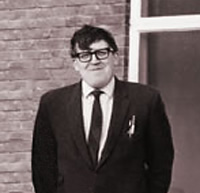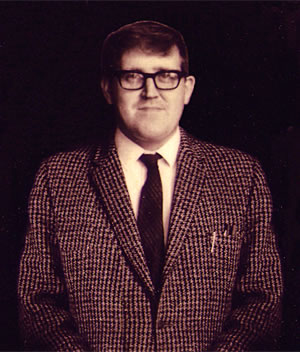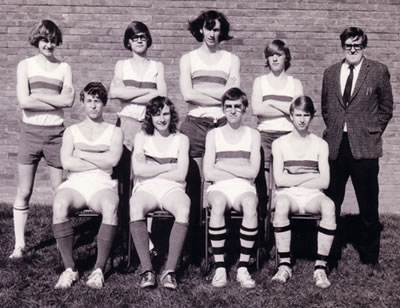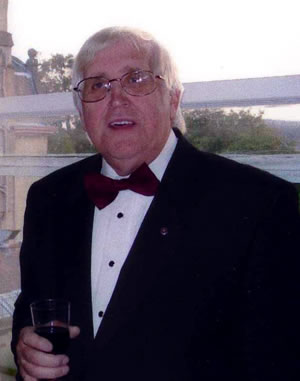Brian Luckett
Burton Grammar School Master (Chemistry 1963 – 1975)
 Brian Luckett was born in 1940 in London, and evacuated first to Newquay, Cornwall and then in 1944 to the very contrasting Colne in North East Lancashire. He was to remain in Lancashire and, during his teenage years, lived close to Pendle Hill where he attended Colne Grammar School. He was a very keen Burnley supporter at this time, always watching them play on a Saturday afternoon, often having played rugby in the morning at school. To this day, despite no longer being able to name any of the players, he finds himself habitually checking on Burnley’s results.
Brian Luckett was born in 1940 in London, and evacuated first to Newquay, Cornwall and then in 1944 to the very contrasting Colne in North East Lancashire. He was to remain in Lancashire and, during his teenage years, lived close to Pendle Hill where he attended Colne Grammar School. He was a very keen Burnley supporter at this time, always watching them play on a Saturday afternoon, often having played rugby in the morning at school. To this day, despite no longer being able to name any of the players, he finds himself habitually checking on Burnley’s results.
Brian had a very influential chemistry teacher, who made chemistry very interesting and exciting and he opted to take it at ‘A’ Level with a view to reading it at University. It was working in the textile mills of Colne during his school holidays that made him want to specifically read Textile Chemistry . In the noisy environment of clattering looms, spinning and carding machines, he became a very good lip reader which, he claims, helped him on numerous occasions in the classroom!
 Brian obtained a BSc (Tech) degree in Textile Chemistry at the University of Manchester Institute of Science and Technology. At this time, the textile industry was going through a crisis and he decided to do a one year Postgraduate Certificate in Education at St. Luke’s College, Exeter. He had little chance of making the college rugby team though with the likes of Don Rutherford and Mike Davis (both future England captains) securing places. It was a much higher standard than the rugby he had enjoyed at school and university. His main teaching practice was at the Technical High School in Torquay.
Brian obtained a BSc (Tech) degree in Textile Chemistry at the University of Manchester Institute of Science and Technology. At this time, the textile industry was going through a crisis and he decided to do a one year Postgraduate Certificate in Education at St. Luke’s College, Exeter. He had little chance of making the college rugby team though with the likes of Don Rutherford and Mike Davis (both future England captains) securing places. It was a much higher standard than the rugby he had enjoyed at school and university. His main teaching practice was at the Technical High School in Torquay.
Mr Luckett had anticipated working in the south west but was attracted by a post at the Burton Grammar School in 1963 to replace the departing Dennis Grimsley which he applied for and was successfully appointed.
The Head of Chemistry was Norman Jones. Also teaching chemistry at the time was Gareth Woods with whom Brian found himself sharing a flat in Blackpool Street. Before long however, Mr Woods was to accept the post of Head of Chemistry at Soham Grammar School in Cambridgeshire meaning that Brian was promoted to second chemistry master and Mr C. Heighington was appointed third.
 Shortly after starting, he was persuaded by Headmaster, Bill Gillion, to take charge of Cross Country. It was a burden he was never really happy with although he can recall many fond times with the likes of Peter Rose, Robert Barningham and David Van Der Merwe in the first eight. In particular, he remembers “a small spindly lad called Chadfield” being a superb terrier who joined the Royal Navy and was found to have TB. He could well have competed at international level had he been treated earlier.
Shortly after starting, he was persuaded by Headmaster, Bill Gillion, to take charge of Cross Country. It was a burden he was never really happy with although he can recall many fond times with the likes of Peter Rose, Robert Barningham and David Van Der Merwe in the first eight. In particular, he remembers “a small spindly lad called Chadfield” being a superb terrier who joined the Royal Navy and was found to have TB. He could well have competed at international level had he been treated earlier.
He never actually ran round any of the courses, instead, he used to drive to the back of Newton Solney to shout support at the poor unfortunates (eminently more sensible). He even sympathised with those that took short cuts as he had done the same at his school, once falling in the canal. Brian was also happy to occasionally drive some of the chess team to away matches at other schools such as Bemrose, Derby School and Repton.
Brian recalls almost being expelled whilst in the 6th form for nearly setting fire to the school chemistry Lab! Having read that if you wrapped some sodium peroxide in wet newspaper it would ignite, he and a friend tried it but with little effect. The teacher, Mr ‘Aldophous’ Smith, shortly came into the laboratory and they threw the paper under a desk close to a radiator. Part way through the lesson, flames suddenly appeared as the correct moisture content was achieved.
With this in mind, he smiles at some of the ‘unofficial chemical experiments’ by pupils at the Grammar School during his time: The banned carbylamine reaction, on putting the constituent reactants down various sinks around the lab, when they all met up in the main drain, the really awful smell was generated in the lower corridor; the manufacture of highly explosive nitrogen tri-iodide powder to be distributed around the school. The staff had to pretend to be cross but couldn’t help but smile.
Brian reflects on what current day health and safety inspectors would make of boys sitting on their stools on top of the benches to watch the practical demonstrations without a safety screen. At the same time, he feels that the complete sanitisation greatly diluted the excitement of the subject that had encouraged previous scholars to take up careers within the chemical industry.
In 1966, Brian married Shirley, the Secretary of the Girls High School, at All Saints Church. Michael Thompson a pupil at the Grammar School played the organ at their wedding. The thought of this leads him to again reflect on many aspects of his time at Burton Grammar School which would seem incredible in the light of today’s educational system but which may well have defined the ethos of the school at that time: How well he, and other members of staff, got on with the boys and their families; how most teachers lived fairly close to the school without any thoughts of being in any way harassed by any of the pupils. He is sure that the chance meeting of boys and parents out of school was very healthy for the discipline and behaviour of school life. To this day, some forty years later, the Luckett’s are still occasionally visited by pupils or their parents, such as Peter Rose’s mother.
Like a number of schoolmasters, Brian also references the Burton Rugby Club as a bonding influence. Staff and pupils were given time off on numerous occasions to, for example, go and watch Burton play an Oxford University XV at Peel Croft, often featuring ex-pupils. It was also host to the Old Boys matches which kept the school’s rugby tradition alive.
On a couple of occasions, Mr Luckett tried to leave Burton Grammar School for higher posts in other schools but Bill Gillion, countered with the offer of a rise in the grading of his current post. He was never quite sure whether this was because of how highly the young staff were valued or whether the headmaster preferred the ‘devils he knew’.
In the early seventies he started the Wildlife Club on the request of pupils Beard and Eaton and, together with Colin Bagshaw, took boys on bird-watching trips to the Norfolk Broads, Slimbridge and other reserves – another “wouldn’t happen today”! ‘Plant a tree in 73’ was one of the catch phrases that helped the small group plant hundreds of trees at the RSPB bird reserve at Coombes Valley in North Staffordshire. To this day, he vows to one day go back to see how they have grown.
He left the school at the end of the final year of Burton Grammar School in 1975 after an offer by Jack Adams, who was a good friend of Norman Jones and the husband of Peggy Adams, head of Physics at the Girls High School, to be Head of Chemistry at Shelton Senior High School in Derby which he accepted. He had been offered the same post two years earlier but had been persuaded to stay.
 Brian was to remain there for fourteen years, before transferring to Wilmorton Tertiary College in 1989. He finally retired from teaching in 1995, but carried on marking ‘A’ Level Chemistry papers for the Cambridge Board for a further six years.
Brian was to remain there for fourteen years, before transferring to Wilmorton Tertiary College in 1989. He finally retired from teaching in 1995, but carried on marking ‘A’ Level Chemistry papers for the Cambridge Board for a further six years.
He looks back at his twelve years at Burton Grammar School as being the happiest of his thirty-two years in teaching and has never regretted taking up the post. The Lucketts and Bagshaws remain good friends together with the once assistant secretary of Burton Grammar School who was largely responsible for his meeting his wife.
Brian enjoys an active retirement being very keen on reading naval fact and fiction, pottering on his allotment and snoozing in his shed, family history, toy and model making and, at the time of writing, is President of the Ashby Rotary Club.

